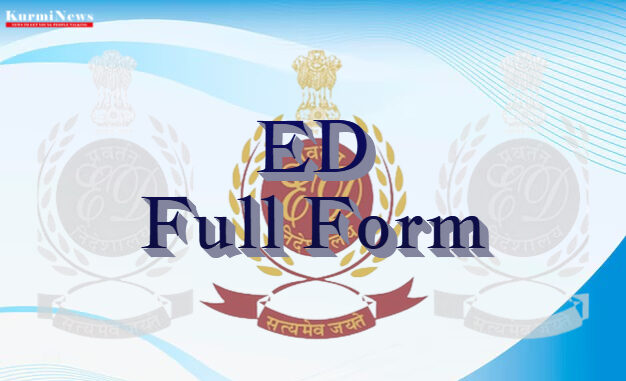Introduction to ED: ED Full Form
ED Full Form: The Enforcement Directorate (ED) stands as a cornerstone in India’s law enforcement framework. As a federal agency falling under the purview of the Union Ministry of Finance, it shoulders the responsibility of upholding economic laws and combating financial crimes.
Establishment and Evolution:
Formally established in 1999 as a department within the Ministry of Finance, ED attained full agency status in 2003. Since then, it has evolved into the nation’s primary economic law enforcement agency, safeguarding the country’s economic interests.
Key Responsibilities: ED Full Form
ED’s mandate revolves around enforcing economic laws, combating economic offenses, and safeguarding the integrity of the national economy. With jurisdiction over economic crimes, foreign exchange, and capital markets, it plays a pivotal role in maintaining financial stability. ED Full Form
Mission and Objectives: ED Full Form
The core mission of ED, as articulated on its official website, is to develop and enforce penal laws to prevent financial crimes and ensure the collection of revenue for the Government of India. Its primary objective is to prevent tax evasion, both fiscal and non-fiscal, thus bolstering the country’s fiscal health.
Operational Framework:
ED operates as both an intelligence agency and a law enforcement body under the Government of India. Its operational scope encompasses enforcing a spectrum of economic laws, including those pertaining to customs, excise, foreign exchange, and the prevention of money laundering. ED Full Form
Where to Learn More:
For further insights into ED’s operations, objectives, and current initiatives, visit their official website at https://www.ed.gov.in. Here, one can delve deeper into the agency’s functioning and its contributions to India’s economic landscape.
What does the Enforcement Directorate do?
ED, the Enforcement Directorate, is a crucial federal law enforcement agency operating under India’s Ministry of Finance. Comprising distinguished officers of the law, it undertakes a spectrum of crime detection and investigation activities.
Principal Objective and Enforcement Actions:
The primary objective of the Enforcement Directorate is to launch criminal investigations into significant economic offenses and recommend prosecution against involved individuals. Under the Prevention of Money Laundering Act (PMLA), ED (ED Full Form) is empowered to prosecute various crimes, including corruption, money laundering, and violations of foreign exchange and securities laws.
Objectives of the Enforcement Directorate:
The key objectives of the Enforcement Directorate include confiscating proceeds of crime, enforcing laws, deterring economic offenses through civil, criminal, and administrative actions, collecting and processing information, examining financial transactions, and investigating economic offenses and terrorism.
Operations: ED Full Form
ED’s operations encompass effectively enforcing laws related to violations of the Foreign Exchange Management Act (FEMA) and other economic offenses. It also involves intelligence gathering, surveillance, detection, and prosecution concerning tax evasion and other economic crimes.
Significant Cases: ED Full Form
Over the past decade, ED has handled significant cases, including the Ganges Canal Dredging Scam and the Aircel Maxis Scam, which involved substantial losses to the Indian exchequer due to foreign exchange irregularities and money laundering.
ED’s Authority:
As per Article 141 of the Indian Constitution, ED is authorized to collect, maintain, and safeguard evidence related to violations of the Prevention of Money Laundering Act, 2002. It can also enforce proceedings under this Act and detain, investigate, and prosecute offenders involved in its violations.
Conclusion:
In conclusion, the Enforcement Directorate (ED Full Form) stands as a pivotal pillar of India’s law enforcement apparatus. With a mandate to combat economic offenses and safeguard the nation’s economic integrity, it plays a crucial role in upholding the rule of law and protecting the country’s financial interests.
FAQs about ED Full Form
What is the Enforcement Directorate (ED)?
ED is a federal law enforcement agency in India under the Ministry of Finance, tasked with upholding economic laws and combating financial crimes.
What are the main objectives of the Enforcement Directorate?
The primary objectives include launching criminal investigations into economic offenses, enforcing laws, deterring offenses, collecting information, and safeguarding the national economy.
What kind of operations does the Enforcement Directorate conduct?
ED conducts operations related to enforcing laws such as the Prevention of Money Laundering Act and Foreign Exchange Management Act. It also engages in intelligence gathering, surveillance, and prosecution of economic crimes.
Can you provide examples of significant cases handled by the Enforcement Directorate?
Some notable cases include the Ganges Canal Dredging Scam and the Aircel Maxis Scam, which involved substantial financial losses and violations of foreign exchange laws.
What authority does the Enforcement Directorate have?
ED is authorized to collect evidence, enforce proceedings, and prosecute offenders under the Prevention of Money Laundering Act, 2002, and other relevant laws, as outlined in Article 141 of the Indian Constitution.

